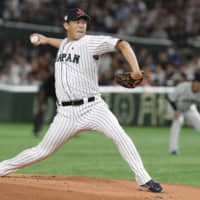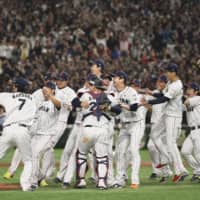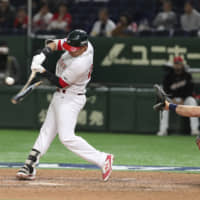Samurai Japan finished its Premier12 campaign in successful fashion on Sunday night with a 5-3 victory over South Korea in the gold medal game at Tokyo Dome.
While it was an accomplishment by itself, the feat was an appetizer en route to the ultimate goal of winning it all at next year’s Tokyo Olympics.
“I think we were able to deliver some encouragement to you through baseball. Hopefully, we’ll become the best in the world again at the Olympics, which is half a year away,” Japan manager Atsunori Inaba told the full-house crowd after the final.
Japan wasn’t exactly dominant throughout the tournament — its 7-1 record included several close games.
One thing that made it possible was a stellar bullpen, particularly the trio of Hiroshi Kaino, Yoshinobu Yamamoto and Yasuaki Yamasaki, who handed the responsibility of working the seventh, eighth and ninth innings of those wins.
Japan’s starting rotation, which lacked a superstar name, was a little vulnerable during the tournament. Pitching coach Yoshinori Tateyama, however, said the team was able to quickly go to the pen when the starters weren’t performing well.
“Looking at the tournament, many teams gave up runs after they issued walks,” he said. “But we had the three pitchers who only had a few walks and could strike out hitters, and that was our strength.”
Kaino, Yamamoto and Yamasaki allowed only one run and six hits and fanned 20 hitters combined in the Premier12. All three have devastating out pitches with good vertical drop that can make batters miss, such as Kaino’s forkball and Yamasaki’s two-seamer.
Catcher Tsubasa Aizawa said those pitches were “without a doubt” effective on an international stage such as the Premier12 against batters mostly unfamiliar with Japan’s pitchers.
Japan led the tournament with 78 strikeouts, but was fourth among the six Super Round teams with a 2.88 ERA.
“I was very nervous deep down inside my heart (when I was playing as a catcher),” Aizawa said of the Japanese hurlers. “But it was actually fine. I could catch their pitches at ease. I could genuinely trust them.”
Samurai Japan’s other strength was its versatility, with a number of players able to play multiple positions.
There will be 24 roster spots during the Tokyo Olympics, compared to 28 at the Premier12. So players able to operate in multiple spots in the field could play an important role. Perhaps the best example of this is Shuta Tonosaki, who played second base, third base and in the outfield during the Premier12.
Overcome with emotion after Sunday’s final out, Inaba was seen with tears in his eyes as he left the dugout. He later said he couldn’t hold back his tears when he thought about the sacrifices his players made.
“Tetsuto (Yamada) and (Hideto) Asamura (who usually play second base) played at first base, which is not their normal position,” said Inaba, who took over the managerial post in 2017. “Tono (Tonosaki) has played at second base, but he played at third base and in the outfield for us. Some of our pitchers, too. (Yudai) Ono, (Taisuke) Yamaoka and Yoshinobu usually start but came out of the bullpen for us.
“They all did so in order for us to become the world champions. And I got emotional.”
Interestingly, both Inaba and head coach Makoto Kaneko mentioned Japan’s Oct. 31 tune-up game against Canada in Okinawa as the moment they believed the team would be able to compete at the Premier12 and beyond.
Japan gave up six runs early in that game but gradually cut into the deficit before coming up just short in a 6-5 loss.
“We figured out that was how we’d play,” said Inaba, who was part of the Japan team that finished fourth at the 2008 Beijing Olympics, the last time baseball was on the program. “We, including our players, understood how our Japan team would play — by scoring one run at a time.”
Looking toward the 2020 Games, Inaba, Tateyama and Kaneko all agreed that the Premier12 team would serve as the foundation for Japan’s Olympic squad.
Kaneko, though, insisted it was hard to tell how many of the players who competed at the Premier12 would be back for the Olympics, since selections will be made during the season and the players’ physical conditions will be a factor.
There will be four fewer spots available, meaning the coaching staff will have its work cut out when it comes time to name a team.
“It’ll be a tough job for us,” Kaneko said of cutting players from the Premier12 squad for the Olympics, in which Japan hopes to capture its first-ever gold medal since baseball became an official sport at the 1992 edition in Barcelona.
Inaba said: “As important as skills are, we want to compete with players who have the highest motivation.”
Source : Baseball – The Japan Times


